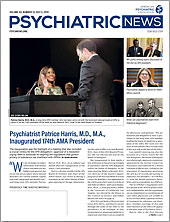“Physician heal thyself.”
As this New Testament proverb suggests, an important step in helping patients lose weight is for their physicians to embrace and model a healthy lifestyle, too, said Robert Barris, M.D., a psychiatrist at Nassau University Medical Center in East Meadow, N.Y.
“We have to embody [health] as health care practitioners,” said Barris during a session on nutritional wellness at APA’s 2019 Annual Meeting in San Francisco. “We can’t just show up to work sleep deprived, having eaten all the wrong foods, and having had too much coffee and then counsel patients on wellness. As healers we have to own it.” Although physicians are less likely to be obese than the average American, the 2007 Physicians’ Health Study found that 40% of the 19,000 doctors studied were overweight and 23% were obese.
A separate study found that a physician’s body mass index (BMI) may be strongly correlated with how he or she diagnoses and counsels patients about diet and eating habits. Among primary care physicians surveyed, 30% of those with normal BMI engaged their obese patients in weight-loss discussions. That number dropped to 18% among overweight or obese physicians. Furthermore, 89% of physicians said they would initiate a weight-loss conversation with their patient when the patient’s weight met or exceeded their own, but that number dropped to 11% when the patient weighed less than the doctor. These findings, by Sarah Bleich, Ph.D., and colleagues, were first published in September 2012 in the journal Obesity.
It is helpful to view the obesity epidemic through the lens of the addiction model, Barris explained to attendees. In this model, individuals lack control in the face of food and continue to overeat despite severe health, social, legal, and financial consequences. Patients who are unsuccessful at reducing consumption then feel guilt, remorse, and distress, which drives more eating.
“Ultimately, we are dealing with the eternal battle in life between the prefrontal cortex and the midbrain pleasure center,” Barris said. “Where mindfulness is important is in activation of the prefrontal cortex to maybe make more enlightened decisions.” Such mindfulness must be practiced again and again, he said.
Lifestyle modification is such an important topic in psychiatry, Barris said, but how can physicians approach it without coming off as nags? “Discussions around food or weight require a certain lightness of touch,” he said. “Who hasn’t messed up and eaten something they didn’t intend to? I think it’s important that our humor and humanness be brought into it.”
Two powerful techniques that have helped patients lose weight are motivational interviewing and food journaling, Barris said. “In psychiatry, we need to be well versed in motivational interviewing.” He noted that most physicians don’t address patients’ smoking or overeating, for a variety of reasons. “We need skillfulness to navigate this shared journey with our patients—to work in collaboration.”
Instead of telling patients how they can eat better or what foods to eat, he advised physicians to discuss with patients their reasons for improving their health and wellness. “As doctors we must ask our patients ‘why do you want to be well or eat healthy?’ ” he said.
To model and encourage more exercise, Barris regularly asks his residents and medical students to take the stairs with him rather than waiting on the elevator, and he leads his patients on brisk walks around the halls when checking in with them.
Barris also leads his patients, residents, and medical students in group mindfulness sessions involving food. For these, each participant receives a small serving of raisins or almonds and is instructed to approach the items mindfully. Participants are asked to consider the smell and feel of the item in their hands, to wonder at their own ability to bring the items to their lips, and to consider where it was grown and the farm workers who picked it. He asks participants to consider giving thanks before and after consuming the food and to think about what they will do with the energy the food provides, such as using it to smile at someone or express a kind word to another person.
Barris said that today’s focus on “normal” values for lipids, BMI, and blood pressure, which are becoming increasingly relaxed, should instead be shifted to “optimal” values. “Do you want normal or optimal health?” he asked. He “went after” his own health five or six years ago by eliminating animal products from his diet and becoming an avid exerciser after his blood pressure started creeping up. He refused to accept his physician’s response that “this is ‘normal’ for a man my age.” ■
“Impact of Physician BMI on Obesity Care and Beliefs” is posted
here.

